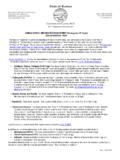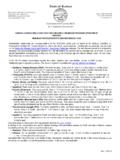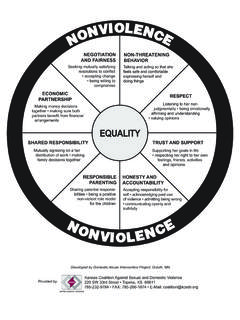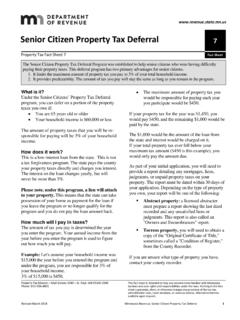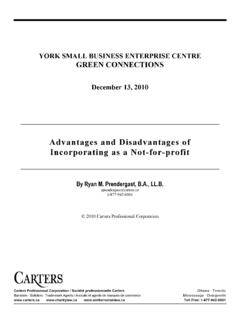Transcription of Health savings account (HSA) Q&As
1 savings account (HSA) Q&AsWhat are HSAs and who can have them?1. What is a Health savings account (HSA) and how does it work?An HSA is a tax-advantaged account established to pay for qualified medical expenses for those who are covered under an HSA qualifying high-deductible Health plan (HDHP) and meet other IRS eligibility requirements. With money from this account , you may choose to pay for Health care expenses until your deductible is met or reimburse yourself at a later date. Then, in accordance with the terms of your Health care plan, your insurance company pays for covered expenses in excess of your deductible. Any unused funds are yours to retain in your HSA and accumulate toward your future Health care expenses or your What are the general features and tax benefits of an HSA?
2 Your contributions are generally pre-tax or tax-deductible Earnings are federal income tax-free Tax-free withdrawals may be made for qualified medical expenses Unused funds and potential earnings are carried over, without limit, from year to year You own the HSA and it is yours to keep even when you change jobs, Health plans or retireContributions are tax-deductible on your federal tax return. Some states do not recognize HSA contributions as a deduction. Your own HSA contributions are either tax-deductible or pre-tax (if made by payroll deduction). See IRS Publication 969. Consult a qualified tax adviser for Who qualifies for an HSA?Generally, an eligible individual is anyone who meets all of the following criteria unless an exception would apply: Covered under an IRS qualifying HDHP Not covered by any other Health plan that is not an HDHP Not currently enrolled in Medicare or TRICARE May not be claimed as a dependent on another individual s tax return4.
3 Who qualifies as a dependent?A person generally qualifies as your eligible dependent for HSA purposes if you claim them as an exemption on your federal tax return. Please see IRS Publication 502 for exceptions at What is a qualifying high-deductible Health plan (HDHP)?A qualifying HDHP is a Health plan that satisfies certain IRS requirements with respect to deductibles and out-of-pocket expenses. In 2017, for self-only coverage, an HDHP has an annual deductible of at least $1,300 and annual out-of-pocket expenses (deductibles, co-payments and other amounts, but not premiums) not exceeding $6,550. In 2018, the annual deductible must be at least $1,350 and annual out-of-pocket expenses not exceeding $6,650 for self-only coverage.
4 For family coverage in 2017, a qualifying HDHP has an annual deductible of at least $2,600 and annual out-of-pocket expenses not exceeding $13,100. In 2018, the annual deductible must be at least $2,700 and annual out-of-pocket expenses not exceeding $13,300 for family coverage. HDHP qualifying deductibles and annual out-of-pocket expenses are are reviewed by the IRS on an annual What other kinds of Health coverage makes an individual not eligible for an HSA?Generally, an individual is not eligible for an HSA if the individual, while covered under an HDHP, is also covered under a Health plan (whether as an individual, spouse, or dependent) that is not an What can I use the HSA for?The funds in the HSA can be used: To pay for qualified medical, dental, vision and prescription drug expenses, including over-the-counter drugs that have been prescribed by a doctor, as defined in IRS Publication 502 As supplemental income, but money withdrawn is taxable and, if you are under age 65, it could be subject to an additional 20 percent penalty8.
5 Can I invest my HSA dollars?Yes, you can choose to invest your HSA dollars into a variety of mutual fund options to help build your HSA dollars to use for future medical expenses or save for retirement. Investments are not FDIC insured, are not guaranteed by Optum Bank , and may lose savings account Q&As9. What other kinds of Health coverage may an individual maintain without losing eligibility for an HSA?An individual does not fail to be eligible for an HSA merely because, in addition to an HDHP, the individual has coverage for any benefit provided by permitted insurance. Permitted insurance is insurance under which substantially all of the coverage provided relates to liabilities incurred under workers compensation laws, tort liabilities, liabilities relating to ownership or use of property ( , automobile insurance), insurance for a specified disease or illness, and insurance that pays a fixed amount per day (or other period) of addition to permitted insurance, an individual does not fail to be eligible for an HSA merely because, in addition to an HDHP, the individual has coverage (whether provided through insurance or otherwise)
6 For accidents, disability, dental care, vision care or long-term Can I use my HSA to pay for medical expenses for a spouse or dependent?Yes. You may use your HSA funds without penalty to pay for qualified medical expenses for yourself, your spouse or eligible dependents even if they are covered under another Health plan. Consult a qualified tax adviser for What if I use my HSA to pay for something other than a qualified medical expense?If HSA funds are used for other than qualified medical expenses, the expenditures are subject to applicable income tax and, for individuals who are not disabled or over age 65, could be subject to an additional 20 percent IRS tax Are Health insurance premiums qualified medical expenses?
7 Generally, Health insurance premiums are not qualified medical expenses. Exceptions include qualified long-term care insurance, COBRA Health care continuation coverage, any Health plan maintained while receiving unemployment compensation under federal or state law and for those age 65 or over (whether or not they are entitled to Medicare), any employer-sponsored retiree medical coverage premiums for Medicare Part A or B, or Medicare HMO. Conversely, premiums for Medigap policies are not qualified medical What happens to the money in my HSA if I no longer have HDHP coverage?Once you discontinue coverage under an HDHP and/or get coverage under another Health plan that disqualifies you from an HSA, you can no longer make contributions to your HSA, but since you own the HSA, you can continue to use the remaining funds for future medical to HSAs14.
8 What happens to my HSA when I enroll in Medicare? Or when my spouse does?If you have chosen to enroll in Medicare you are no longer eligible to contribute to your HSA. Any contributions made after your Medicare coverage begins may incur a tax penalty. Note that Premium-free Part A coverage begins 6 months back from the date you apply for Medicare (or Social Security/RRBbenefits), but no earlier than the first month you were eligible for Medicare. Please consult a tax advisor regarding your eligibility to contribute and any potential tax implications. For more information on Medicare, visit the State Health Insurance Assistance Program website, or contact by phone 1-800-MEDICARE. If you are currently contributing to an HSA as a family plan, and your spouse enters in to Medicare alone while you remain in an HDHP, then you would be deemed self-only coverage for your HSA contribution limits.
9 You would be allowed to continue contributing to your HSA up to the appropriate IRS limit for self-only coverage, and use your HSA funds to pay or be reimbursed for qualified medical Who may contribute to an HSA?Anyone may contribute to the HSA of an eligible individual. If an employee establishes an HSA, for example, the employee, their employer, or both may contribute to the employee s HSA in a given year. If a self-employed or unemployed individual establishes an HSA, that individual may contribute to the HSA. Family members may also make contributions to an HSA on behalf of another family member as long as that other family member is an eligible individual. Keep in mind, all contributions from all sources count toward your IRS maximum contribution Can I enroll in both an HSA and a Health Flexible Spending account (FSA)?
10 If you enroll in both an HSA and an FSA or Health Reimbursement Arrangement (HRA), you cannot make deductible contributions to the HSA for that coverage period if the FSA or HRA are general purpose arrangements that pay or reimburse for qualified medical expenses. However, you still may be able to make deductible contributions to an HSA even if you are also covered under an FSA or HRA if those arrangements are limited purpose FSAs or HRAs that restrict reimbursements to certain permitted benefits such as vision, dental or preventive care benefits. Other permissible combinations include suspended HRAs and post-deductible FSAs or HRAs. Contact your legal or tax adviser to review these How much can I contribute to my HSA?

